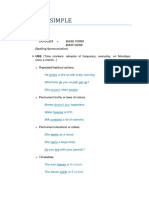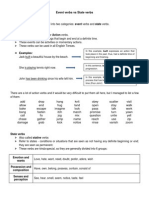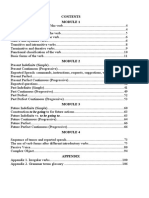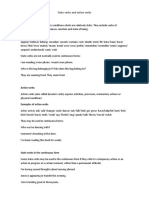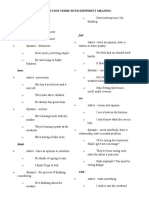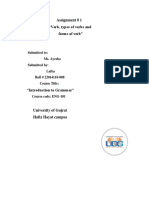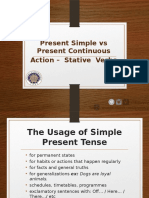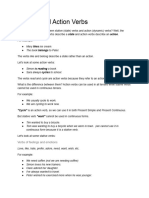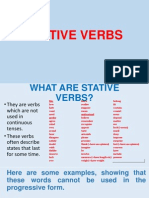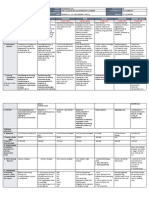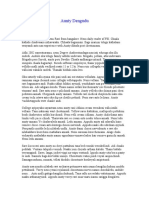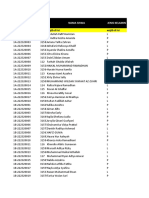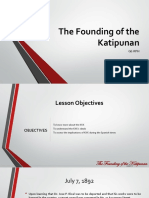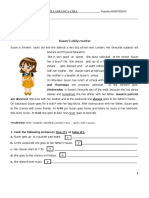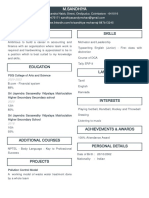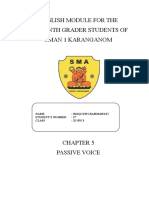Verb Patterns
Uploaded by
Esthela SalazarVerb Patterns
Uploaded by
Esthela SalazarVerb Pattern Summary 1 v6
x
Contents:
1. STATIVE VERBS
t.m 2
of
2. SAY & TELL 5
r
3. DO VS. MAKE 6
.p
4. REMEMBER VS. REMIND 8
w
5. KNOW VS. KNOW HOW 8
w
6. JOINING TWO VERBS 9
7. CAUSATIVE VERBS 12
w
8. THE SUBJUNCTIVE MOOD 15
9. PRESENT PARTICIPLES AND INFINITIVES AS NOUNS 18
10. PARTICIPLES AS ADJECTIVES 18
11. IMPERATIVES 19
12. WISH 20
13. CONDITIONALS 22
1
Page
This material is ONLY provided for FREE and EDUCATIONAL PURPOSES.
May 15 2005 Compiled by Prof. Tirso A. Rodríguez O. tirso@proft.mx 2018
Verb Pattern Summary 1 v6
STATIVE VERBS
ACTION VERBS STATIVE VERBS
Stative verbs (or state verbs / non-
Action verbs (or dynamic verbs) are progressive verbs) DESCRIBE STATES,
verbs that DESCRIBE ACTIONS. CONDITIONS AND SITUATIONS.
These verbs ARE NOT USUALLY USED
IN THE CONTINUOUS FORM.
You're WORKING hard today. I LIKE that song.
You WORK hard. I’m liking that song.
x
I’m PLAYING chess with my friend. She HEARD some music playing.
I PLAY chess with my friends.
They are SWIMMING in the sea.
t.m She was hearing some music playing.
All cars HAVE wheels.
of
They SWIM in the sea. All cars are having wheels.
r
.p
What are you EATING for dinner? I’ve KNOWN him since 1999.
What do you EAT for dinner? I‘ve been knowing him since 1999.
w
w
She is READING a book. I AGREE with you.
w
She READS books. I’m agreeing with you.
We were DANCING at the party. I don’t UNDERSTAND.
We DANCED at the party. I’m not understanding.
How long have you been DRIVING? It will SMELL of wild flowers.
How long have you DRIVEN? It will be smelling of wild flowers.
What language is he SPEAKING? It WEIGHED just over 200 kg.
What language does he SPEAK? It was weighing just over 200 kg.
2
Page
This material is ONLY provided for FREE and EDUCATIONAL PURPOSES.
May 15 2005 Compiled by Prof. Tirso A. Rodríguez O. tirso@proft.mx 2018
Verb Pattern Summary 1 v6
STATIVE VERBS:
Measures /
Perception /
Emotions Opinion Possession States/ Other
Senses
Qualities
appear desire agree belong consist concern
feel* dislike assume have* measure* forget
hear enjoy* believe include contain imagine
look* envy consider involve cost know
resemble fear deserve owe depend mean
see* hate disagree own deserve notice
seem hope doubt possess involve realize
smell* like feel* (=have exist recognize
sound love an opinion) fit remember
taste mind find (= hold understand
need consider) matter
x
prefer guess measure
promise
regret
imagine(=ha
ve an
t.m weigh*
(=have
of
surprise opinion) weight)
want impress
r
.p
wish matter
mean
w
remember
w
suppose
think*
w
*There are some few verbs that can be both action and state verbs depending on their
meaning.
Being= 'behaving' or 'acting' Be=part of your personality or quality
You are BEING nice these days. You are nice.
thinking = mental process / consider, have in my
think = believe / have an opinion
head
What are you THINKING about? I THINK you are right.
3
I'm THINKING about my next project. I THINK she is a nice girl.
Page
This material is ONLY provided for FREE and EDUCATIONAL PURPOSES.
May 15 2005 Compiled by Prof. Tirso A. Rodríguez O. tirso@proft.mx 2018
Verb Pattern Summary 1 v6
Having = part of an expression have = possess, own
I'm HAVING fun / lunch/ a party / a bath
I HAVE two cars.
/ a good time / a break / something to
drink/ breakfast.
Seeing = meeting with / have a relationship with See = see with your eyes / understand
I'm SEEING my friends Friday night.
I SEE him now.
We’ve been SEEING each other for a long
I SEE what you mean.
time.
Looking = directing your eyes to something; phrasal
Look = Appearance
verbs
She’s LOOKING at the stars.
I`m LOOKING for a job. (seeking)
That dish LOOKS delicious!
x
She’s LOOKING after the children.
(taking care of)
Smelling/ Tasting =when a person uses their nose or
mouth (the action of)
t.m Smell / Taste: has a certain smell or taste
of
He’s SMELLING the roses. My hands SMELL of onion.
The chef's TASTING the soup. It TASTES like real fruit.
r
.p
Thinking / Feeling = consider, have in mind, or
Think / Feel = have an opinion
experiencing emotions or health issues
w
I’m THINKING about getting a new job. I THINK that’s a great plan!
w
I’ve been FEELING unusually sad. I FEEL that the information is not correct.
w
weighing/measuring = when a person performs the
Weigh / Measure = has a certain weigh or measure
action of something (the action of)
The butcher is WEIGHING the meat. The suitcase WEIGHS 25 kilos.
They´re MEASURING the distance The assembled table MEASURES: 69 x 45
between the lamps. x 60 cm.
Although ‘enjoy’ is a stative verb, it is used in the
Be happy and get pleasure from
continuous tense
I’m ENJOYING life a little more. I ENJOY life.
4
Page
This material is ONLY provided for FREE and EDUCATIONAL PURPOSES.
May 15 2005 Compiled by Prof. Tirso A. Rodríguez O. tirso@proft.mx 2018
Verb Pattern Summary 1 v6
SAY & TELL
What did they SAY?
What did they TELL you?
Mary SAID that you were not here.
They SAID goodbye to me.
Jim will TELL Ann that he loves her.
Karen SAID that she was upset.
The doctor TOLD me that I have to stop smoking.
Please TELL me your name,
Kim SAID that the play was great.
x
SOMEONE SAY SOMETHING
Johanna SAID that she was tired. t.m
of
SOMEONE SAY SOMETHING TO SOMEONE
r
.p
w
Johanna SAID that she was tired to Jim.
w
w
SOMEONE TELL SOMEONE SOMETHING
Johanna TOLD ME that she was tired.
SOMEONE TELL or ASK SOMEONE TO DO SOMETHING
The doctor TOLD /ASKED me to stop smoking.
They TOLD/ASKED me to be on time,
Ann will TELL/ASK them to study.
5
Page
This material is ONLY provided for FREE and EDUCATIONAL PURPOSES.
May 15 2005 Compiled by Prof. Tirso A. Rodríguez O. tirso@proft.mx 2018
Verb Pattern Summary 1 v6
DO VS. MAKE
We use DO when…
We talk about an activity without saying exactly what it is:
DO something!
What is Vivian DOING?
What did you DO yesterday?
My secretary DID everything that I asked her to DO.
Could you DO something for me?
Jim doesn’t know what to DO.
What can I DO for you?
They like DOING nothing.
What are you DOING this evening?
x
I’ll DO what I can to help them.
DO as you wish!
I have nothing to DO.
t.m
r of
We talk about work and chores:
.p
She isn’t going to DO any work.
w
Andy always DOES his work cautiously.
She doesn’t like to DO housework.
w
Do they DO their homework for today?
w
Suzy hates DOING the cooking.
Finally, we also use DO WITH THESE NOUNS:
DO a FAVOR
DO ERRANDS
DO BUSINESS
DO the DISHES
DO a LESSON
DO your BEST
6
Page
This material is ONLY provided for FREE and EDUCATIONAL PURPOSES.
May 15 2005 Compiled by Prof. Tirso A. Rodríguez O. tirso@proft.mx 2018
Verb Pattern Summary 1 v6
We use MAKE when …
We talk about creation, construction, performance, production,
manufacturing:
We are going to MAKE some sandwiches.
She MAKES cakes.
I MADE a lot of doors.
They will MAKE a boat.
We talk about nouns DERIVED from verbs:
Make an AGREEMENT (agree)
Make a DECISION (decide)
Make a DISCOVERY (discover)
x
Make an OFFER (offer)
Make a PROMISE
t.m
(promise)
of
We also use MAKE with these NOUNS:
Make an IMPRESSION Make a VISIT Make a SPEECH
r
.p
Make a NOTE Make a MISTAKE Make a NOISE
Make a FIRE Make a TRIP Make a HOLE
w
Make an IMPROVEMENT Make a COPY Make a MEAL
w
Make a PLAN Make an OFFER Make a CUP OF …
w
Make an EFFORT Make a LIST Make a FILM
Make a PHONE CALL Make an EXCUSE Make the BED
7
Page
This material is ONLY provided for FREE and EDUCATIONAL PURPOSES.
May 15 2005 Compiled by Prof. Tirso A. Rodríguez O. tirso@proft.mx 2018
Verb Pattern Summary 1 v6
REMEMBER VS. REMIND
You can REMEMBER DOING SOMETHING or TO DO SOMETHING.
You can REMIND SOMEONE to DO SOMETHING.
Compare the following examples:
I REMEMBER CLOSING the door. ( I did it and now I remember it)
She REMEMBERS TO BRING the letter. ( She doesn’t forget to bring it)
Please REMEMBER TO WRITE your name! (don’t forget to write it down)
Can you REMIND ME TO CALL her? (you will tell me again to call her)
REMEMBER Ving SOMETHING
x
REMEMBER TO VW SOMETHING
REMIND t.m
SOMEONE TO VW SOMETHING
r of
.p
w
KNOW VS. KNOW HOW
w
KNOW is used to express KNOWLEDGE and KNOW HOW to express
w
ABILITY.
Study the following examples:
KNOW + NOUN
KNOW + HOW + TO + VW
She KNOWS HOW TO PLAY the guitar.
We don’t KNOW HOW TO COOK.
I KNOW COOKING.
8
Page
We DON’T KNOW MATH.
This material is ONLY provided for FREE and EDUCATIONAL PURPOSES.
May 15 2005 Compiled by Prof. Tirso A. Rodríguez O. tirso@proft.mx 2018
Verb Pattern Summary 1 v6
JOINING TWO VERBS
VERB (Verb Phrase) Ving
John stopS WORKING here.
John stopPED WORKING here.
We will try to avoid ANSWERING their questions.
x
We’ tried to avoid ANSWERING their questions.
Alice will enjoy DANCING.
t.m
of
Alice enjoyed DANCING.
r
.p
admit discuss imagine quit
advise dislike insist on recall
w
appreciate do not mind involve recommend
w
approve of endure keep resent
w
avoid enjoy keep on resist
be better off escape leave off risk
can't help excuse look forward to stop
can't stand face mention suggest
complete feel like mind tolerate
consider finish miss think about
contemplate forget about object to think of
count on forgive postpone understand
delay get through practice
deny give up prefer
9
detest go on put off
Page
This material is ONLY provided for FREE and EDUCATIONAL PURPOSES.
May 15 2005 Compiled by Prof. Tirso A. Rodríguez O. tirso@proft.mx 2018
Verb Pattern Summary 1 v6
VERB TO (NOT TO) VW
We decided TO TAKE a taxi.
We decided NOT TO TAKE a taxi.
They seem TO HAVE a lot of money.
afford dare learn regret
agree decide like remember
appear demand love seem
arrange deserve manage start
ask determine mean swear
x
attempt
be
bear
expect
fail
forget
t.m neglect
offer
plan
tend
threaten
trouble
of
beg happen prefer try
r
begin hate prepare want
.p
care have pretend wish
w
claim help promise
w
choose hesitate propose
consent hope refuse
w
VERB TO VW/Ving
John started TO SMOKE.
John started SMOKING.
I don’t like TO SMOKE.
I don’t like SMOKING.
10
Page
This material is ONLY provided for FREE and EDUCATIONAL PURPOSES.
May 15 2005 Compiled by Prof. Tirso A. Rodríguez O. tirso@proft.mx 2018
Verb Pattern Summary 1 v6
advise forget need start
allow go on permit try
attempt hate prefer watch
begin hear propose
bother intend regret
continue like remember
forbid love see
VERB OBJECT VW
John let ME watch him work.
x
He will let HIM go.
His dad made HER cry. t.m
of
feel help make see
r
hear let notice watch
.p
w
w
VERB OBJECT TO VW
w
Andy expected VIVIAN to be here.
Can you remind ME to call her tonight?
Karen got SOMEBODY to help her.
Advise expect like recommend
allow forbid mean (intend) request
ask force need remind
bear get (persuade) oblige teach
11
beg hate order tell
Page
cause help permit tempt
This material is ONLY provided for FREE and EDUCATIONAL PURPOSES.
May 15 2005 Compiled by Prof. Tirso A. Rodríguez O. tirso@proft.mx 2018
Verb Pattern Summary 1 v6
command instruct persuade trouble
compel intend prefer want
enable invite press warn
encourage leave promise wish
CAUSATIVE VERBS
A CAUSATIVE VERB expresses a cause. Causative verbs are used when
one thing or person causes another thing or person to do something.
x
She MAKES me COME = She HAS me COME = she GETS me TO COME
t.m
= She LETS me COME = She HELPS me COME = She HELPS me TO
COME
of
I MAKE the computer WORK = I HAVE the computer WORKED = I
GET the computer WORKED = I LET the computer WORK
r
.p
w
MAKE
w
w
MAKE SOMEONE VW
MAKE SOMETHING VW
She MAKES me COME.
She MADE me COME.
She WILL MAKE me COME.
I MAKE it WORK.
I MADE it WORK.
I WILL MAKE it WORK.
12
Page
This material is ONLY provided for FREE and EDUCATIONAL PURPOSES.
May 15 2005 Compiled by Prof. Tirso A. Rodríguez O. tirso@proft.mx 2018
Verb Pattern Summary 1 v6
HAVE
HAVE SOMEONE VW
HAVE SOMETHING Vpp
Jim HAS Tony BRING his TV.
Jim HAD Tony BRING his TV.
Jim WILL HAVE Tony BRING his TV.
Suzy HAS it REPAIRED.
Suzy HAD it REPAIRED.
Suzy WILL HAVE it REPAIRED.
x
GET
t.m
r of
GET SOMEONE TO VW
.p
GET SOMETHING Vpp
w
w
I GET Jerry TO CLEAN the house.
w
I GOT Jerry TO CLEAN the house.
I WILL GET Jerry TO CLEAN the house.
I GET my car PAINTED.
I GOT my car PAINTED.
I WILL GET my car PAINTED. 13
Page
This material is ONLY provided for FREE and EDUCATIONAL PURPOSES.
May 15 2005 Compiled by Prof. Tirso A. Rodríguez O. tirso@proft.mx 2018
Verb Pattern Summary 1 v6
LET
LET SOMEONE VW
LET SOMETHING VW
My mom LETS me GO.
My mom LET me GO.
My mom WILL LET me GO.
Tom LETS the bird GO.
Tom LET the bird GO.
Tom WILL LET the bird GO.
x
HELP
t.m
r of
HELP SOMEONE TO VW/VW
.p
w
She HELPS Andy TO DO his homework.
w
She HELPS Andy DO his homework.
She HELPED Andy TO DO his homework.
w
She HELPED Andy DO his homework.
She WILL HELP Andy TO DO his homework.
She WILL HELP Andy DO his homework.
14
Page
This material is ONLY provided for FREE and EDUCATIONAL PURPOSES.
May 15 2005 Compiled by Prof. Tirso A. Rodríguez O. tirso@proft.mx 2018
Verb Pattern Summary 1 v6
THE SUBJUNCTIVE MOOD
The subjunctive mood is used to indicate if an idea is a matter of desire
or possibility.
It is used in “that” clauses naming demands, recommendations, desires, etc.
S + RECOMMEND + that + S + VW + C
The teacher will RECOMMEND that everybody BE on time.
The RECOMMENDATION + BE + that + S + VW + C
The RECOMMENDATION is that everybody BE on time.
x
The teacher will RECOMMEND that everybody DO the homework.
t.m
The RECOMMENDATION is that everybody DO the homework.
of
I will RECOMMEND that you WORK better.
r
The RECOMMENDATION is that he WORK better.
.p
w
I will RECOMMEND that he SMOKE less.
The RECOMMENDATION is that you SMOKE less.
w
w
PATTERN 1: S + ASK / DEMAND / DESIRE / INSIST / PREFER /
PROPOSE / RECOMMEND / REQUEST / REQUIRE / SUGGEST / URGE +
that +S + VW + C
They INSISTED that I BE late.
Jim PREFERS that she STAY at home.
The teacher WILL RECOMMEND that everybody BE on time.
Andy DESIRES that Vivian BE here.
I SUGGESTED that everybody GO.
15
Notice that the main verb in the clause is always in VERB WORD form.
Page
This material is ONLY provided for FREE and EDUCATIONAL PURPOSES.
May 15 2005 Compiled by Prof. Tirso A. Rodríguez O. tirso@proft.mx 2018
Verb Pattern Summary 1 v6
PATTERN 2: The + DEMAND / INSISTENCE / PREFERENCE /
PROPOSAL / RECOMMENDATION / REQUEST / REQUIREMENT /
SUGGESTION + is/was /will be/ … + that + S + VW +C
The RECOMMENDATION IS that everybody BE on time.
The SUGGESTION WAS that the class START at 8:00.
The REQUEST WILL BE that all students PAINT their rooms.
Notice that the main verb in the clause is always in VERB WORD form.
PATTERN 3A: IT + is/was /will be/ … + ESSENTIAL / IMPERATIVE /
IMPORTANT / NECESSARY + THAT + S + VW + C
x
It is IMPORTANT THAT everybody STUDY harder.
It was NECESSARY THAT I BREAK the window.
It will be IMPERATIVE THAT we FINISH on time.
t.m
of
Notice that the main verb in the clause is always in VERB WORD form.
r
.p
PATTERN 3B: IT + is/was /will be/ … + ESSENTIAL / IMPERATIVE
/ IMPORTANT / NECESSARY + TO VW + C
w
w
It is IMPORTANT TO STUDY harder.
w
It was NECESSARY TO BREAK the window.
It will be IMPERATIVE TO FINISH on time.
16
Page
This material is ONLY provided for FREE and EDUCATIONAL PURPOSES.
May 15 2005 Compiled by Prof. Tirso A. Rodríguez O. tirso@proft.mx 2018
Verb Pattern Summary 1 v6
ask
demand
desire
insist
prefer
S propose that S VW C
recommend
request
require
suggest
urge
demand
x
insistence
The
t.m
preference
proposal
BE that S VW C
of
recommendation
request
r
.p
requirement
suggestion
w
essential
w
imperative
It is/was /will be that S VW C
w
important
necessary
BUT
essential
imperative
It is/was /will be to VW C
important
necessary
17
Page
This material is ONLY provided for FREE and EDUCATIONAL PURPOSES.
May 15 2005 Compiled by Prof. Tirso A. Rodríguez O. tirso@proft.mx 2018
Verb Pattern Summary 1 v6
PRESENT PARTICIPLES AND INFINITIVES AS NOUNS
We can often use the -ing and TO VW forms of a verb as NOUNS.
Verb -ing To VW
read Reading To read
swim Swimming To swim
jog Jogging To jog
eat Eating To eat
TO READ is a great habit. (El leer es un excelente hábito)
READING is a great habit. (La lectura es un excelente hábito)
x
t.m
TO SWIM is very healthy. (El nadir es muy saludable.)
SWIMMING is very healthy. (La natación es muy saludable])
r of
.p
PARTICIPLES AS ADJECTIVES
w
We can often use the -ing and -ed forms of a verb as ADJECTIVES.
w
w
Verb -ed -ing
bore bored boring
The –ed form tells us HOW the person FEELS.
The -ing form tells us WHY the person FEELS LIKE THAT.
Tom is BORED because it is a BORING film.
18
Page
This material is ONLY provided for FREE and EDUCATIONAL PURPOSES.
May 15 2005 Compiled by Prof. Tirso A. Rodríguez O. tirso@proft.mx 2018
Verb Pattern Summary 1 v6
IMPERATIVES
The indicative mood is used to make affirmative and negative
statements as well as to ask questions.
Study the following examples:
I will travel next weekend.
We play soccer professionally.
Has she arrived to Houston?
They won’t buy our car.
We are tired.
The imperative mood is used to give commands (informal orders,
instructions, directions, invitations, offers, warnings, etc.):
x
Study the following examples:
Sit down! (order)
Move on! (order)
t.m
of
First close and the turn on. (instructions)
r
Walk down for three blocks then turn left and cross the
.p
street.(directions)
w
Have some coffee? (offer)
Want to come? (invitation)
w
Don’t talk to strangers! (warning)
w
19
Page
This material is ONLY provided for FREE and EDUCATIONAL PURPOSES.
May 15 2005 Compiled by Prof. Tirso A. Rodríguez O. tirso@proft.mx 2018
Verb Pattern Summary 1 v6
WISH
Wish is used TO SAY WHAT WE WOULD LIKE:
I WISH TO VW
I wish to finish
I WISH TO FINISH soon.
I WISH TO GET more money.
I WISH TO FIND an apartment.
It is used TO SAY HOW WE WANT SOMEBODY TO DO SOMETHING:
I WISH WOULD VW
x
I wish
I WISH somebody WOULD GIVE some water.
you
t.m would do
of
I WISH Tommy WOULD DO his homework.
I WISH mom WOULD FIX their office.
r
.p
It is used TO SAY HOW WE WANT SOMETHING TO HAPPEN:
w
w
I WISH WOULD VW
w
I wish it would stop
I WISH it WOULD STOP raining.
I WISH the movie WOULD START on time.
I WISH Karla WOULD NOT GET married.
20
Page
This material is ONLY provided for FREE and EDUCATIONAL PURPOSES.
May 15 2005 Compiled by Prof. Tirso A. Rodríguez O. tirso@proft.mx 2018
Verb Pattern Summary 1 v6
It is used TO SAY HOW WE DESIRE THAT SOMETHING BE DIFFERENT. It
is used to regret:
I WISH NOUN Vsimple past
I wish I had
The verb to be is usually used more as WERE
than WAS for all persons.
I WISH I HAD a car.
I WISH I WERE rich
I WISH SHE WERE here.
x
It is used TO SAY HOW WE HAD DESIRED THAT SOMETHING HAPPEN.
We lament it didn’t happen:
I WISH NOUN
t.m HAD Vpp
of
I wish Mary had come
r
.p
I WISH MARY HAD COME to the party.
w
I WISH I HADN’T LEFT Mexico City.
w
I WISH YOU HAD BEEN here.
w
21
Page
This material is ONLY provided for FREE and EDUCATIONAL PURPOSES.
May 15 2005 Compiled by Prof. Tirso A. Rodríguez O. tirso@proft.mx 2018
Verb Pattern Summary 1 v6
CONDITIONALS
1ST CONDITIONAL: This conditional usually refers to the future. There is no hesitation
involved.
This pattern is used to express a future idea that is practical and possible.
Study and compare the following examples:
If I STUDY, I WILL PASS my exam.
x
If I DON’T STUDY, I WON’T PASS my exam.
If I STUDY, I WON’T FAIL in my exam.
If I DON’T STUDY, I WILL FAIL in my exam.
If it RAINS, we WILL NOT GO.
t.m
of
If it DOESN’T RAIN, we WILL GO.
r
If they WIN, they WILL BE the champions.
.p
If she COMES, I WILL BE happy.
w
w
w
2ND CONDITIONAL: This conditional usually refers to unreal events in the present.
This pattern is used to express an idea that is contrary to fact in the present.
Study and compare the following examples:
If I HAD MONEY, I WOULD BUY a house.
If she HAD time, she WOULD STUDY more.
If I WERE you, I WOULD BUY this PC.
If he WERE sensible, he WOULDN’T DO that.
If they PRACTICED more, they WOULD DO it better.
If he DIDN’T WORK, he WOULD BE ABLE TO come.
22
If the rents WEREN’T so high, I WOULD LIVE alone.
Page
This material is ONLY provided for FREE and EDUCATIONAL PURPOSES.
May 15 2005 Compiled by Prof. Tirso A. Rodríguez O. tirso@proft.mx 2018
Verb Pattern Summary 1 v6
3RD COMDITIONAL: This conditional usually refers to unreal events in the past.
This pattern is used to express an idea that is contrary to fact in the past:
Study and compare the following examples:
If I HADN’T DRUNK too much, I WOULDN’T HAVE CRASHED my car.
(I drank too much)
If I HAD HAD the money, I WOULD HAVE BOUGHT it.
(I didn’t have money)
If it HADN’T SNOWED, they WOULD HAVE COME.
(It snowed)
If I HAD KNOWN you were coming, I WOULD HAVE WAITED for you.
(I didn’t know)
If he HADN’T BEEN sick, he WOULD HAVE GONE with us.
(I was sick)
x
t.m
r of
.p
w
w
w
23
Page
This material is ONLY provided for FREE and EDUCATIONAL PURPOSES.
May 15 2005 Compiled by Prof. Tirso A. Rodríguez O. tirso@proft.mx 2018
You might also like
- Grammar Present Simple Present Continuous Femme VertueuseNo ratings yetGrammar Present Simple Present Continuous Femme Vertueuse13 pages
- Present Tense Grammar Practice An 1B Curs 1No ratings yetPresent Tense Grammar Practice An 1B Curs 110 pages
- ADVANCED STATE-ACTION VERBS Explanation+exercisesNo ratings yetADVANCED STATE-ACTION VERBS Explanation+exercises9 pages
- 1 - Present Simple - Cont. - Stative VerbsNo ratings yet1 - Present Simple - Cont. - Stative Verbs12 pages
- Formation:: Present Indefinite (Present Simple)No ratings yetFormation:: Present Indefinite (Present Simple)4 pages
- Affirmative Negative Interrogative: S S S Doesn't Doesn't Doesn't Does Does DoesNo ratings yetAffirmative Negative Interrogative: S S S Doesn't Doesn't Doesn't Does Does Does24 pages
- A University Grammar of English: Randolph Quirk Sidney GreenbaumNo ratings yetA University Grammar of English: Randolph Quirk Sidney Greenbaum32 pages
- (PDF) Select Reading Answers Mark Tuấn - Academia.edu50% (2)(PDF) Select Reading Answers Mark Tuấn - Academia.edu1 page
- SOW - Grade 6 - Language and Literature - FT - 23-24No ratings yetSOW - Grade 6 - Language and Literature - FT - 23-2412 pages
- Unit 2 Innovation: Prof. Corina Chire RosasNo ratings yetUnit 2 Innovation: Prof. Corina Chire Rosas19 pages
- Individual Reading Profile School TemplateNo ratings yetIndividual Reading Profile School Template4 pages
- Chapter 5 - Grammatical Contrastive AnalysisNo ratings yetChapter 5 - Grammatical Contrastive Analysis70 pages
- The Input Hypothesis Issues and Implications - KrashenNo ratings yetThe Input Hypothesis Issues and Implications - Krashen17 pages
- Active Vs Passive Voice - Risqi Dwi Rahmawati - 27 - XI IPS 3No ratings yetActive Vs Passive Voice - Risqi Dwi Rahmawati - 27 - XI IPS 36 pages






